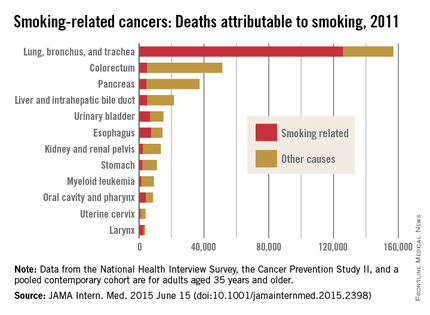Of the nearly 346,000 U.S. deaths caused by smoking-related cancers in 2011, about 48.5% were attributable to cigarette smoking, according to a research letter published online June 15 in JAMA Internal Medicine.
The latest data available for adults aged 35 years and older show that, of the 12 cancers determined to be caused by smoking, those most likely to be attributed to cigarette smoking were cancers of the lung, bronchus, and trachea (80.2%) and the larynx (76.6%). Lung cancers were, by far, the most numerous, representing 126,000 of the nearly 168,000 total smoking-attributable cancers, said Rebecca L. Siegel of the American Cancer Society, Atlanta, and her associates.
The next most numerous smoking-attributable cancer was that of the esophagus, with a total of 7,300 deaths in 2011, they reported (JAMA Intern. Med. 2015 June 15 [doi:10.1001/jamainternmed.2015.2398]).
The investigators suggested that the “generally lower proportions of deaths caused by smoking in 2011 than in 2000 to 2004” may be the result of a drop in the prevalence of smoking from 23.2% in 2000 to 18.1% in 2012.
Data for the study came from the National Health Interview Survey, the Cancer Prevention Study II, and a pooled contemporary cohort (a group of five studies). Statistical methods and data sources match those used in smoking-attributable mortality calculations in the 2014 surgeon general’s report on smoking.
Analysis of the data was funded by the American Cancer Society. Four of the seven researchers are employees of the ACS.


